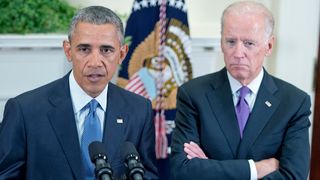In a United States Studies Centre interview with John Bolton shortly after he was abruptly fired by Donald Trump in September 2019, the former national security adviser speculated that a Biden administration would behave in much the same way as the second-term Obama administration. This was not a compliment.
Barack Obama left office seemingly content to manage America’s graceful decline as the world’s pre-eminent power. Under Obama, America was cautious and unprepared to act decisively, had a distaste for the reality of international competition and was increasingly outmanoeuvred by hungrier authoritarian powers such as China and Russia.
Biden has been in the White House for several weeks and has brought back in people from the Obama era to fill key positions. Thankfully, Bolton’s fears have not come to pass, especially regarding approaches to China. For example, the new administration has not removed Trump’s tariffs and other economic measures against China. It reaffirmed a previous assessment by then secretary of state Mike Pompeo that genocide is being committed in Xinjiang. The US Navy recently sailed a guided missile destroyer through the Taiwan Straits to indicate that it will continue the strong support given to Taiwan during the previous four years.
In short, Biden is going out of his way to dispel fears about a lack of resolve, which is no small thing. The absence of this immeasurable but demonstrable quality meant Obama’s pivot to Asia was not as reassuring to allies or unsettling for rivals as it might have been. But showing that one is up for the fight is only the first step. The next is not dismissing everything that occurred during the past four years as an aberration.
Take Trump’s America First, which the Democrats have rightly dismissed as provocative and divisive. The rhetoric of it should certainly be junked, as should many of the shortsighted and counter-productive policies that arose out of it, such as the questioning of the value to America of putting resources and attention to enhancing its unmatched network of alliances and partnerships or disinterest in pursuing American interests through influencing institutions.
Biden is going out of his way to dispel fears about a lack of resolve [...] But showing that one is up for the fight is only the first step. The next is not dismissing everything that occurred during the past four years as an aberration.
Even so, Trump was on to something when it comes to understanding the problem, even if those expecting solutions were left wanting. Who now believes in unfettered globalisation, that nation-states matter less rather than more, or that China gaming the system has only benign consequences? A global pandemic and the scramble for medical supplies and vaccines, spiralling threats and coercive actions by expansionist authoritarian powers and realisation that beneficiaries of the economic system such as China have been seeking to distort markets and prices and change the rules more generally, rather than defend them as responsible stakeholders ought to do, mean the old complacencies are dying.
Not just in the US, but in Australia and elsewhere, the conversation is about the importance of domestic renewal and protecting oneself from external threats. The emerging themes are now advancing sovereign capabilities and national resilience.
Given strategic non-alignment and economic autarky is either impossible or prohibitively expensive, what should they mean? The Morrison government, as well as those in Japan, Taiwan and even some European nations, are thinking sensibly about it. In the economic sense, sovereign capabilities and national resilience is better achieved through diversifying away from one dominant supplier or market and reforming. In the military sense, it is about having well-integrated and complimentary capabilities across various locations that can counter or deter the expansionary ambitions of a country such as China. And in a technological sense — especially when there are military or strategic implications — it is about creating new safeguards when it comes to foreign acquisitions and prioritising collaborations with allied and friendly economies sharing similar rules, values, and interests.
In the broadest sense, it is not about self-sufficiency but reimagining globalisation and advancing interdependence in all these contexts between friendly and secure nations. In Australia’s case, as with others, it is also about renegotiating the way one interacts with nations such as China and setting expectations about unacceptable behaviour and interaction, especially as it relates to interfering with domestic institutions and policies.
This is where the Biden administration comes in, because the US remains the indispensable nation, even though the country’s unipolar moment of uncontested power after the implosion of the Soviet Union is over.
This is where the Biden administration comes in, because the US remains the indispensable nation, even though the country’s unipolar moment of uncontested power after the implosion of the Soviet Union is over. Talk of diversity or security of supply chains depend enormously on US economic presence, involvement, markets, innovation, expertise, and finance. The same with setting liberal economic and industry rules and standards because it is generally the prerogative of those with a dominant commercial presence to do just that. For this to occur, we need well-regulated firms from the advanced democracies, America most of all, to emerge as the major players in key sectors.
Like Australia, nations such as Japan, Taiwan, Singapore, and India are enhancing their military capabilities and reassessing their posture to respond to the expanding presence of the People’s Liberation Army — as are nations in Europe vis-a-vis Russia. They can only do so in strategic, military, economic, and technological collaboration with the US. In all this, the convening and co-ordinating power of Washington is unrivalled and irreplaceable.
Biden has promised to reinvigorate US alliances and partnerships, which is far easier said than done. The good news is that defending the sovereign privileges and national resilience of these nations is largely the same thing as doing the same for the US.




